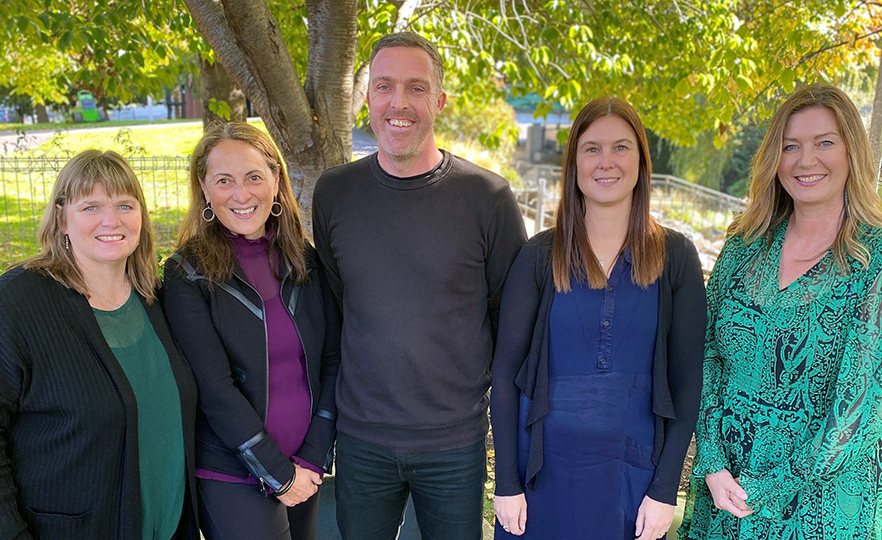
Left to right: ENGAGE trainers Lynda Harris and Anne Denham, Methodist Mission Southern Chief Development Officer Jimmy McLauchlan, Associate Professor Dione Healey, and Under-Secretary for Education Jo Luxon.
PHOTO: Philippa Crick, Cre8ive Marketing.
A University of Otago-developed programme that teaches self-regulation to preschool children has received $19.7 million in government funding for a nationwide roll out to early childhood centres.
The ENGAGE programme is a method of building self-regulation skills in children, aged 3–5, that has been widely trialled and has had positive outcomes so far that will benefit the next generation.
It's the brainchild of Associate Professor Dione Healey, from the Department of Psychology, who worked in partnership with Otago Innovation Limited (OIL) and the Methodist Mission Southern to trial the programme in Dunedin early childhood centres. The trial was then expanded to 28 centres and, in the past two years, the programme has been funded by the Ministry of Education to be included in 300 centres in Dunedin, Auckland and the Bay of Plenty.
The government funding, which will see ENGAGE expand to 1,830 centres nationwide by 2027, is an "incredible outcome", Associate Professor Healey says.
"I have always been focused on intervention and doing research that will have a real world impact and to now be in a position where my programme is being rolled out nationally is, to be honest, still hard to believe.
"To me, the ultimate goal of research is for your findings to have a clear impact and as a clinician my goal is to improve people's wellbeing and quality of life. We are funded by taxpayers so it is wonderful to be able to give back to them."
Associate Professor Healey says ENGAGE teaches self-regulation through play and these skills can have the potential to change children's lifetime trajectory. The programme aligns well with the 2010 findings from the Dunedin Study that showed how poor self-regulations at age three was predictive of a wide array of adverse adult outcomes including higher rates of unemployment, learning difficulties, relationship difficulties, criminal activity, mental health issues and substance abuse.
"Self-regulation is a core skill needed for a wide range of activities across the lifespan," she says.
"Within the ECE setting children learn a wide range of self-regulation skills within ENGAGE including things like slowing down, remembering instructions, waiting their turn, managing their emotions, and planning activities, which are important not only within ECE but in all life settings and in helping to prepare children for school."
In research trials with a diverse range of whānau, ECE, and primary school participants both in Aotearoa and overseas, ENGAGE has consistently been associated with statistically significant improvements in children's self-regulation development, she says.
OIL worked alongside Associate Professor Healey to develop ENGAGE to the stage where the rights could be licenced to the Methodist Mission Southern, which then delivered the programme to early childhood centres.
OIL further supported and refined the programme to a point that saw the Ministry of Education come on board as a major advocate of ENGAGE.
Chief Executive Officer David Christensen says the impact ENGAGE could have on young children and their families and caregivers was evident from his first meeting with Dr Healey, and it has been great to see this reaffirmed by Methodist Mission Southern and the Ministry of Education.
"That young children can often have behavioural issues is well known," he says.
"What is not known is that when delivered appropriately, interventions such as Dione's ENGAGE have an ability to vastly improve aspects of behaviour such as self-regulation."
Under-Secretary for Education Jo Luxton, who visited Kelsey Yaralla Kindergarten in Dunedin yesterday to announce the funding, says the ENGAGE trial has been a huge success and it's time to scale it up so more pre-schoolers can benefit.
ENGAGE has seen significantly reduced hyperactivity, less aggression, and fewer peer problems in children taking part, she says.
"As a former early learning teacher and early childhood centre owner, and as a mother, I know how important it is for young children to be able to manage their emotions and behaviours for themselves and with others.
"Having more young children learn these skills from an early age will not only benefit them, but also their teachers, parents and wider society.
"As more children from ENGAGE enter our classrooms, we also hope that their ability to self-regulate will allow teachers to spend more time teaching, and less time dealing with behavioural issues, and for students to spend more of their time at school learning," Jo Luxton says.
Under-Secretary Luxon says the expansion is part of the Government's response to the Royal Commission of Inquiry into the terrorist attacks on Christchurch Masjidain in March 2019.
"This Government knows how important it is to give every child in Aotearoa New Zealand the best start in life. This $19 million funding boost to teach behavioural skills to more of our young children is another significant step towards achieving that goal," she says.






